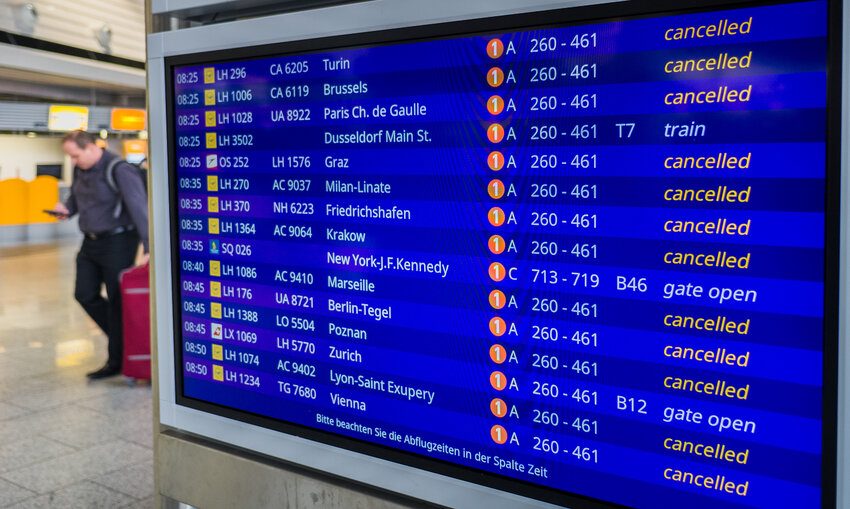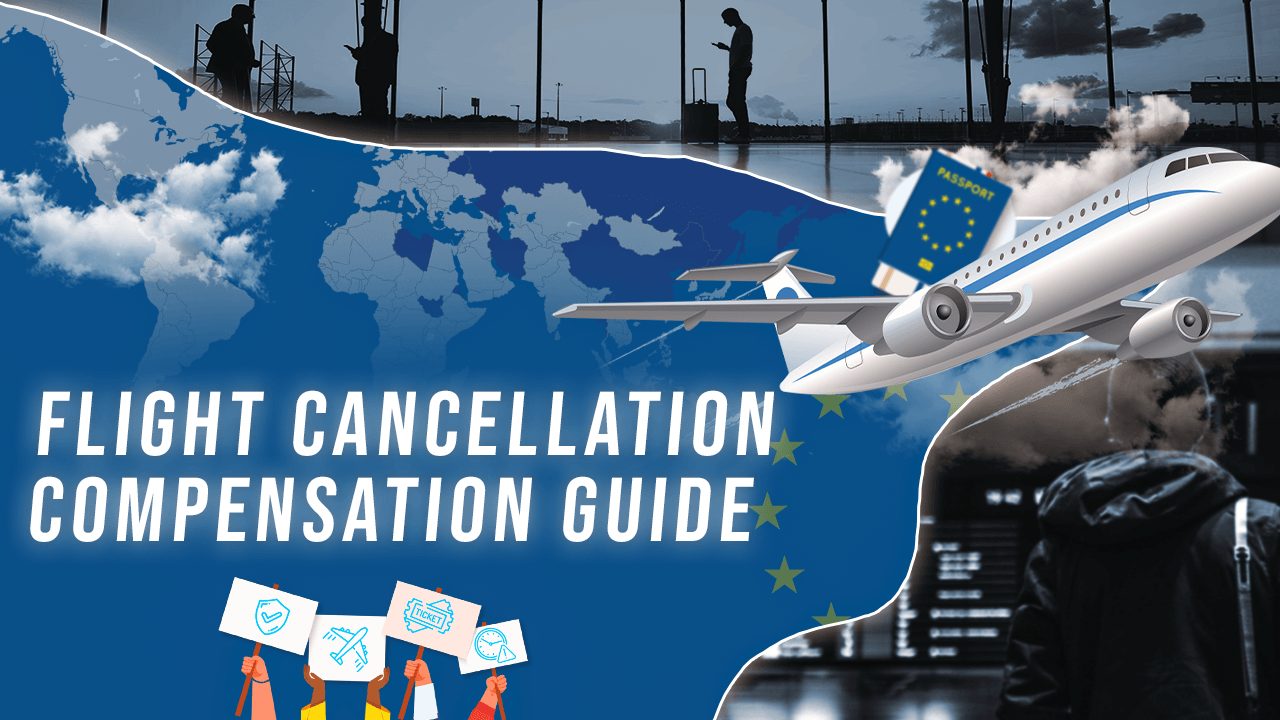Flight cancellations can turn your well-planned trip into a stress-filled ordeal. But don’t fret! Europe’s EC 261 regulation can be your saving grace, ensuring you’re compensated for such unexpected changes. Our flight cancellation compensation guide will arm you with the information you need to turn a travel mishap into a win, ensuring you’re not just a passenger, but a passenger with rights. Information in this article was updated in 2026.
Key Takeaways
- EC 261 is a European regulation that safeguards air passengers’ rights, ensuring compensation in case of flight cancellations. This includes options for refund or re-routing, along with additional compensation depending on circumstances.
- If a flight cancellation causes a delay of three hours or more, passengers have the right to meals, refreshments, and communication. If the delay necessitates an overnight stay, the airline must also provide accommodation and necessary transportation.
- During the process of flight rebooking, airlines may offer an upgrade or downgrade of the passenger’s seat. Any upgrade should be offered free of charge, while downgrades should result in a refund between 30 to 75 percent of the original fare.
- In case of flight cancellations, airlines might offer benefits such as travel vouchers, meal tickets, or even cash compensation. However, it’s essential to ensure that acceptance of these benefits doesn’t waive the right to further compensation under EC 261.
- Passengers can directly submit a claim to the airline or seek help from professional services. For a successful claim, they must gather and provide extensive documentation, including boarding passes, cancellation confirmation, and receipts of additional costs due to the cancellation. However, passengers should carefully read any documents provided by the airline to avoid inadvertently waiving their rights to future compensation under EC 261.
Flight Cancellation Compensation Rights Overview
If your flight never left the tarmac, then you’re in luck! This counts as a cancelled flight, even if you boarded the plane. Now, most cancelled flights don’t get that far. Typically, you’ll get a notification on your phone or via email that your flight has been cancelled, and you need to contact customer service. If you’re already at the airport, it will show up on the board. You’ll mosey your way over to the customer service desk with all the other unlucky passengers to see what they can do for you to help you get to your destination, whether that’s booking you on the next flight, or rescheduling you, or placing you on standby.
If you aren’t able to get to your destination using your original flight method, your flight is cancelled. Under EC 261, it defines a cancelled flight as “The non-operation of a flight which was previously planned and on which at least one place was reserved.” That’s essentially a fancy way to say that if you bought a seat on a plane and you were not able to use it because the plane was not going to your destination, then your flight is cancelled.
Under EC261, airlines are required to give you 14 days‘ notice if your flight is cancelled, and if they don’t, then you may be eligible for compensation, depending on your flight, distance, destination, and more. Additionally, even if they get you on another flight, if the arrival time varies significantly (at least 3 hours) from when you were originally set to arrive, then you also meet the criteria to file under EC 261. Working with a specialized company can help you get the maximum compensation you deserve. Ultimately, if the issue that caused the cancellation was within the airline’s control, you should receive something when you understand your rights.
What Circumstances Apply?

EC 261 is powerful, but unfortunately for passengers, it doesn’t apply to all flights, just ones flying in the European Union or European airspace. Your flight must have had a touchpoint in the EU to qualify, mostly taking off though some arriving flights will qualify depending on the airline carrier. Other qualifying circumstances include:
- If your flight was confirmed, and you had a confirmation number, flight number, seat number, and more.
- If the airline notified you of the cancellation less than 14 days in advance of your departure date.
- If you were rebooked, your new arrival time was significantly delayed from your original time.
- If the reason for the cancellation was within the airline’s control and extraordinary circumstances did not apply.
- If the cancellation occurred within the last three years, though this time may vary depending on the country it occurred in. Each country has different time frames that you can file a claim, so it’s important to understand what your rights are.
The amount of compensation that you can claim depends on the length of the flight, the length of your “delay” if you request a new flight, and the destination of your flight. As long as the circumstances are within the airline’s control, then you are eligible for compensation under EC 261. If you receive any services from their airlines, do not sign anything until you read the fine print. You may unintentionally sign your rights away to file future claims against them in response to your delay.
EC 261 generously favors the passengers, but it can’t do anything if you voluntarily waive your rights. If you do, work with the airline directly to see if they will offer any additional compensation for your troubles. Some may just to maintain a strong relationship.
What Flight Cancellation Compensation Can You Get?
EC 261 spells out very clear guidelines for the compensation you can claim under its regulations. It is a set fee that’s outlined based on the time of delay, distance, and location of your flight. If your flight was cancelled within 14 days of your planned departure, you are also eligible for compensation.
Now, these only apply if it’s within the airline’s control. If there was a freak storm that no one saw coming, this will qualify as an extraordinary circumstance. However, if there is an airline strike and they can’t get enough people to staff the flight, that doesn’t qualify. It’s all about the qualifying circumstances, so make sure that you pay attention to the factors at play to get the compensation you deserve.
As your flight is cancelled, the airline must work with you to get to your final destination. They can offer you a new flight, and it should be as close to your original arrival time as possible, even if it’s on another carrier. You can also choose another date and time if it’s convenient for you, but the keyword is that it is your choice. The airline can’t determine it for you. If that’s not an option, then you can also ask for a full or partial refund and a return flight if you’re not at home.
Once you determine what you want to do with your cancelled flight, you can now start worrying about additional compensation. You could be eligible to receive up to €600 in compensation for your cancelled flight. This is per person, too, so don’t forget to file for all of your party that was impacted by the cancellation. EC 261 helps hold airlines accountable in the hopes that flight cancellations within their control will soon be a thing of the past.
How Much Compensation Can You Claim For A Cancelled Flight?
When your flight is cancelled, the first thing you think of likely isn’t the length of the delay, but shift your perspective. Your original flight is cancelled, but you’re working to get on another flight. Take the time you would have arrived and compare it to your new arrival time. That counts as the length of your delay. If you chose not to rebook, then your flight never arrived, which is another form of delay.
Ultimately, it’s in the best interest of the airline to prevent paying for additional compensation, meals, accommodation, transportation, and more as a result of their delay.
| Under 2 hours | 2 - 3 hours | 3 – 4 hours | Over 4 hours | Never arrived | Distance |
|---|---|---|---|---|---|
| €125 | €250 | €250 | €250 | €250 | All flights 1,500 km or less |
| €200 | €200 | €400 | €400 | €400 | Internal EU flights over 1,500 km |
| €200 | €200 | €400 | €400 | €400 | Non-internal EU flights 1,500 km - 3,500 km |
| €300 | €300 | €300 | €600 | €600 | Non-internal EU flights over 3,500 km |
You can calculate your flight distance bellow.
Rerouting
One way that airlines get away with not paying additional fees is by rerouting you, but there are some rules that they have to follow in order for that to apply. The chart breaks down the amount of advanced notice that’s required and the qualifying circumstances that will lead to them not paying a fee. If they do not meet these qualifications, then you can file a claim under EC 261. Similar compensation would apply for re-routing circumstances. You are entitled to receive up to €600 depending on the circumstances of your flight.
| Advance Notice | Re-routing Requirements |
|---|---|
| 14 Days | None |
| 7 – 13 Days | Alternative flight departing no more than 2 hours before and arriving less than 4 hours after the original flight |
| Less than 7 Days | Alternative flight departing no more than 1 hour before and arriving less than 2 hours after the original flight |
Cancelled Flights under EC 261

EC 261 applies in the European Union and select European airspace, but if you’re flying in different countries, there may be other regulations that apply. These include the Montreal Convention, Brazilian ANAC 400, and US passenger laws.
EC 261 has set the standard for how airline passengers should be treated when they face a delay, cancellation, denied boarding, and more. Even if your luggage is lost, you may qualify for compensation, so it’s important to understand your rights under this law. You can file a claim with the airline if your flight is cancelled, and here is what’s covered.
What Flights are Covered?
In order to claim cancelled flight compensation under EC 261, you need to fly in eligible territories, regardless of your citizenship. So if you’re an American citizen, you can still claim compensation if you’re traveling in the EU, which is a nice perk!
Keep in mind that most routes in the European Union are covered, even the outermost regions that most people don’t think of when they think of Europe. These include the Canary Islands, Madeira and the Azores, French Guiana and Martinique, Mayotte, Guadeloupe and La Réunion, and Saint-Martin. Iceland, Norway, and Switzerland airspace are also part of EC 261, even if they aren’t part of the EU proper.
Other flights that are covered include:
- Flights from inside the EU to inside the EU on EU and non-EU carriers.
- Flights from inside the EU to outside the EU on EU and non-EU carriers.
- Flights from outside the EU to inside the EU as long as it’s on an EU-based air carrier.
Now that you know if your flight is covered, then you can start thinking about the other circumstances surrounding your cancellation. Were you given proper notice? If not, you’re eligible for compensation. Was your delay more than 3 hours? If yes, you’re eligible for compensation. The circumstances surrounding your flight make a difference in just how much you can claim. In the most inconvenient situations, you can claim up to €600 in compensation under EC 261.
At the end of the day, if you’re traveling in the EU on EU airlines, chances are that you will be eligible for a claim. Most issues that lead to cancellations are within the airline’s control.If you’re unsure, you can always file and see what happens. The worst they can say is no, but sometimes will offer additional compensation.
What Flights are NOT Covered
If you’re flying on a non-EU-based carrier, then the likelihood that your flight is not covered under EC 261 is slightly higher. This is true when you’re flying from outside the EU to inside the EU and when your entire flight is outside the EU. To qualify for EC 261, the most important detail about your flight is that it must have some touchpoint in the European Union or qualifying airspace.
Even if you are, there are some circumstances that could disqualify you from filing a claim, namely if you are facing extraordinary circumstances. These are things that are outside of the airline’s control but still impact their ability to operate. This includes extreme weather, airport strikes, political unrest, and more. But, even if you face extraordinary circumstances, you may still be able to file a claim. In these cases, the airline needs to show that they have taken all reasonable measures to avoid the cancellations.
For example, if there’s an anticipated storm front, they can try to work in advance to reroute or reschedule your flights. If they don’t and you can prove other airlines did, then you may be eligible for a claim. Even if it’s extraordinary circumstances, airlines have to do their due diligence. This can be muddy legal waters, so it may be hard for an average person to prove, which is why many rely on professional legal help to make their case.
The good news is that airline strikes recently moved from extraordinary to controllable circumstances since they are airline employees. Courts routinely review the exceptions to ensure that passengers are getting the right level of service under EC 261. It’s about making sure that the air travel system works as efficiently as possible, and when they don’t hold them accountable.
Are Connecting Flights Included?
Yes! Connecting flights are included as you consider your flight compensation. If your connecting flight is cancelled with no explanation within 14 days, then you can file a claim. Now, the same circumstances apply for your connecting flight as they do for your departure and arrival. It has to be within the EU, if your flights were purchased under the same booking number, and more.
There have been some cases where courts do not recognize connecting flights as part of the itinerary, so if you have a complex case, you may want to seek out a specialized company. They can help advocate for you on behalf of EC 261 and navigate any legal loopholes with ease. If your flights are within the EU or eligible airspace, you should be eligible to recoup your losses, regardless of what leg of the trip you’re on.
What Are My Flight Cancellation Compensation Rights?

One of the best parts of EC 261 is that it clearly states what your rights are. No longer do you have to wonder what you can receive during the cancellation process. It’s all spelled out! After you get to your destination, you can worry about filing other claims, including your right to compensation.
Ultimately, you are protected when you fly in the EU thanks to EC 261, and your rights depend on the circumstances surrounding your cancellation. Let’s explore more about what you can expect if your flight is cancelled. If you want to get to your final destination, you’ll get there in style!
Flight Refund or Rerouting
Initially, you have three choices when it comes to flight cancellations, and you make your choices long before you start thinking about compensation under EC 261, so it shouldn’t complicate the matter.
First, you should be offered a full or partial refund of your ticket. If you’re in the middle of your trip, you can claim compensation for the unused portion of your trip. If you want to return home, you should also be offered a return flight. You have the choice to terminate your trip right there if the new flight will not be convenient. Do not let the airline try to force you if it does not work for your schedule. They may even pay for transport home outside of flight if this is the case, and under EC 261, you must be reimbursed within 7 days.
Next, the alternate flight they propose should be the earliest possible alternative transportation to your final destination. In most cases, this will be the next flight the airline can offer. However, in some cases, it may be through another airline or even a bus or train. It is the airline’s responsibility to get you where you need to go as fast as they can, even if it’s not with them. They lost that right when they cancelled your flight.
Lastly, if you prefer to go at a later date, they should issue you a new ticket to the same final destination at a later date of your choosing. Again, the keyword here is choice. You have the choice of when you want to arrive at your final destination, though, of course, this is subject to availability. They’re not going to bump someone off a flight because of a cancelled flight.
There are a lot of details that go with each of these options, so it’s important to read the fine print to see what you are agreeing to. In some cases, airlines will put tricky wording into their contracts to get you to waive your right to file a claim at a later date. If this is the case and you wish to file under EC 261, do not sign the paper. Instead, much of what they are offering you they are required to do under the law. You do not have to sign a document to claim it.
If they fly you to a different airport in the same city, the airline must pay to transport you to your original destination. If not, you can negotiate a nearby address if more convenient.
Has your flight been cancelled?
Don’t let flight cancellation issues cost you – get compensated up to €600!
What Else is Covered Under EC 261?
Refunds and re-routing are just the beginning of what’s covered under EC 261. You also have the right to care, notice, upgrades/downgrades, further compensation, and more. Again, it’s all about the circumstances around your cancellation, so take note of everything to get the most out of it.
Right to Care
If your flight has been cancelled, then you have the right to care as you wait. Your delay has to be at least three hours for these rights to start kicking in, and once they do, you are eligible for meals, refreshments, access to communication, and more. If you are delayed long enough that you would seek overnight accommodations, then the airline must provide that to you, in addition to any transport you need to get to and from your hotel.
You should not be facing any incremental costs as a result of their airline’s negligence, so make sure to save all your receipts. They should reimburse you for any costs you incur, including food, drink, hotels, clothes, and more. Anything that you have to pay out of pocket should be reimbursed, so make sure that you save all your receipts.
Upgrade/Downgrade
As the airline navigates getting customers rebooked and re-routed to their final destinations on new flights, you may be offered to upgrade or downgrade your reservation in order to accommodate you on the quickest flight. If they do, that’s great – but don’t pay for it. You don’t have to. And, if they downgrade you, then they should be paying for you!
If you are lucky enough to be upgraded to a higher class, it should be done free of charge. The airline cannot charge you more because it is their fault you need to make a new reservation. If the opposite happens, that’s okay too. You can get reimbursed for your downgrade from 30 to 75 percent of your original fare, which is a steal. If you can stand the smaller seats, you may want to consider this as an option.
The airline cannot require you to pay for anything that’s happening as a result of the initial cancelled flight, and that includes upgrading your seat. If the issue was in their control, then they are at fault, and you can rest assured that they are handling your re-booking with the utmost care.
Further Compensation
When your flight is cancelled, the airline is likely going to be generous. They want to accommodate you, and they’ll start offering things they typically would not. This can include miles, travel vouchers, meal and drink tickets, and more. Some will even offer cash compensation for you to voluntarily relinquish your rights.
Consider what is being offered and what you give up by accepting them. In some cases, you will waive your rights to receive further compensation. If you do not sign anything, then you will not waive your rights. Just because you accept these does not mean that you are excluded from seeking restitution in the future, as long as you are within the timeframe.
The airline is required to rebook you and get you to your destination if that is what you chose, so don’t let any goodwill gestures make you feel guilty and prevent you from filing claims against EC 261 in the future. As long as you didn’t waive your rights, then you should be eligible to file a claim.
Right to Notice
By law, the airline is required to notify you of your rights. Typically, they will have a printout when you check in or near the customer service desk. If not, they should be posted elsewhere. Your rights should be easily accessible and provided in a way that you can read them should you have any questions. If your rights are not posted, please request them directly from the airline. They are legally obligated to provide them from you in qualifying countries and territories.
COVID-19 Flight Cancellations
COVID-19 completely uprooted the airline industry, causing many flights to be cancelled as a result. Much like no one could have anticipated the long-lasting effects this pandemic would have on the world, neither could the airline industry. As such, COVID-19 qualified as extraordinary circumstances. If your flight was cancelled as a result of COVID-19, you do not qualify for additional compensation under EC 261 or any other global flight compensation regulations.
You could still be eligible for refunds, credits, and more, so don’t hesitate to reach out directly to the airline to understand your rights. They don’t want you to travel if you are COVID positive.
How to Claim Compensation for Cancelled Flights?
Once you get your details settled about your cancelled flight, it’s time to file a claim under EC 261. If you do not file a claim, you will not get additional compensation. You can submit a claim yourself directly through the airline, or you can work with a specialized company that can help you receive the compensation you deserve. You can find the best flight cancellation compensation companies bellow.
Filing EC261/2004 compensation claim form yourself is exactly as it seems. You gather your documentation and submit it directly to their customer service. Their teams will review your claim to determine if it is valid or not, and often, they will try to reject it on a technicality to avoid paying out. You can file an appeal, but you’re at their airline’s mercy when you try to navigate EC 261 claims yourself.
On the other hand, you can work with a specialized company. These companies are staffed with legal professionals who are well versed in flight compensation law. You still gather all your documentation; however, you turn it over to them to review. If they think you have a valid claim, they’ll accept the case and work on your behalf. Most flight compensation companies only get paid if you win, so it’s in their best interest to advocate on your behalf. They take a flat fee from the top of your winnings, though the amount will vary from company to company. Some may also charge an additional fee if they have to go to court on your behalf. Either option is valid to file a claim against EC 261.
Documentation Needed
The more documentation you can gather, the better, so as soon as you learn your flight has been cancelled, start collecting! Your future self will thank you. Some of the documentation that you can collect includes:
- Official EC261/2004 compensation claim form
- Boarding passes, travel documents, vouchers, and anything else that proves your flight has been cancelled. Take a picture of the flight board if you’re already in the airport of the line that says your flight is cancelled, or screenshot any communication you receive.
- Ask the airline for written confirmation of your flight cancellation and the reasoning behind it. This is in addition to the boarding communications you may have received.
- Keep any receipts of any incremental costs that you incurred as a result, including meals, toiletries, clothing, transportation, hotels, and more (if the airline has not already provided you with vouchers for these materials).
Work directly with the airline on an alternate flight to your destination, and note your time of arrival. This is critical as you start to receive compensation when you’re at least 3 hours delayed to your destination. The airline should also pay for meals, refreshments, transportation, and accommodation if your new flight requires you to stay overnight and/or through standard meal times. If you do not need to continue on your trip, you can also request a refund.
If the airline provides you with anything, make sure that you read the fine print. You do not want to sign any waivers to your rights to future compensation. If you do, you will not be eligible to claim compensation under EC 261.
Recently Cancelled Flights
| Date | Airline (Flight number) | Route | Status | Your compensation |
|---|
Video Version
Conclusion
You have rights if your flights are cancelled, so make sure that you understand what you’re entitled to, both directly from the airline as a result of your inconvenience and under EC 261. This regulation protects air passenger rights when they travel in many European countries, so all that’s left is to file a claim.
FAQ
-
What is flight cancellation compensation?
Flight cancellation compensation is a monetary amount that airlines are required to pay to passengers when their flight is cancelled under certain circumstances, as governed by laws such as EU Regulation EC 261/2004.
-
How much is flight cancellation compensation?
The compensation amount varies based on the distance of the flight. For flights up to 1,500 km, you may get up to €250. For flights between 1,500 km and 3,500 km, it may be up to €400. For flights over 3,500 km, you could get up to €600.
-
How to claim compensation for a cancelled flight?
To claim compensation, you can directly contact the airline with EC261/2004 compensation claim form and all relevant details of your cancelled flight and ask for compensation. Alternatively, you can engage a specialized flight compensation company to handle the claim on your behalf.
-
How long do I have to claim compensation for a cancelled flight?
Depending on the country of the airline, you typically have up to two to six years from the date of the flight to claim compensation.
-
What documentation do I need to claim flight cancellation compensation?
You’ll need evidence of your flight booking, evidence of the cancellation (like an email or SMS from the airline), receipts for any extra expenses incurred due to the cancellation, and any communication or documentation provided by the airline about the cancellation.
-
Does flight cancellation compensation apply only for EU flights?
No, EC 261 compensation applies to all flights departing from the EU, as well as flights into the EU if operated by an EU carrier. Other countries may have their own regulations regarding flight cancellations, so it’s important to check specific rules for the country where the airline is based.
-
What to do if your flight is cancelled?
If your flight is cancelled, the first step is to contact the airline to understand the options available to you. They may offer rebooking on an alternate flight, provide accommodation if necessary, or offer compensation, depending on the circumstances and regulations. Keep all relevant documentation and communicate with the airline to ensure you receive the necessary assistance.





